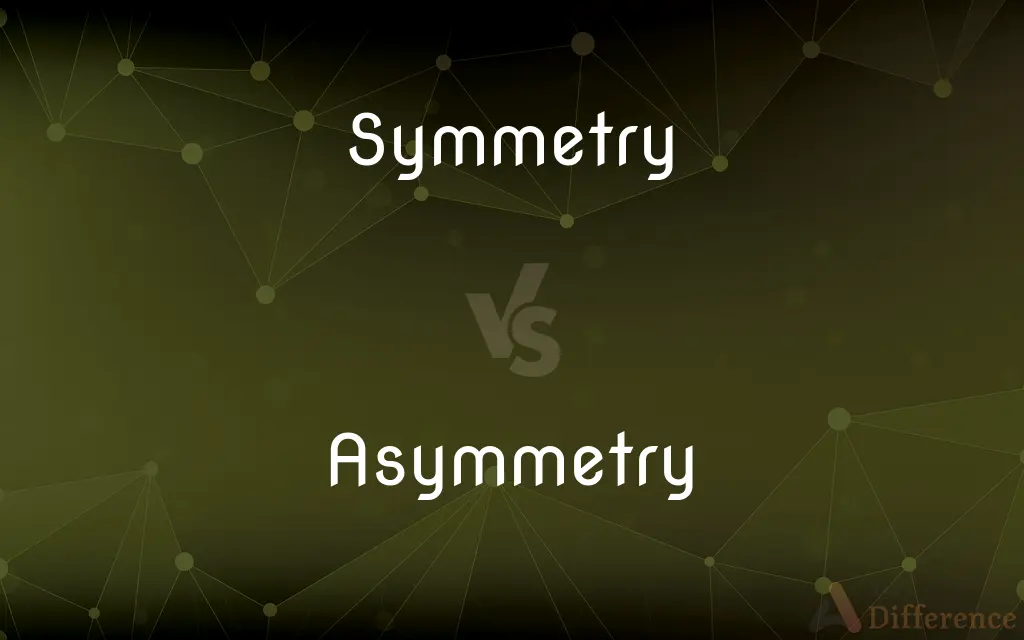Symmetry vs. Asymmetry — What's the Difference?
By Tayyaba Rehman & Fiza Rafique — Published on September 24, 2023
Symmetry refers to balanced proportions and equal elements on both sides of an axis, while Asymmetry involves a lack of balance or equality between parts.

Difference Between Symmetry and Asymmetry
Table of Contents
ADVERTISEMENT
Key Differences
Symmetry is an aesthetic or functional arrangement where elements mirror each other across a central axis. Whether in art, architecture, or natural formations, symmetry provides a sense of balance and harmony. Asymmetry, conversely, involves an uneven or unbalanced distribution of elements, often creating a sense of tension or dynamism.
In mathematical terms, symmetry involves equal proportions and dimensions on either side of a line, plane, or point. Asymmetry, in mathematical context, represents a deviation from these equal proportions, a break in balance that often makes a shape or structure more complex or interesting.
Symmetry often lends itself to ease of understanding, as the balanced elements make it easier to predict or interpret the other side. Asymmetry, on the other hand, requires more cognitive effort to understand because it lacks the simplicity and predictability inherent in symmetrical arrangements.
In design and art, symmetry often suggests stability, order, and formality. Asymmetry, in contrast, is frequently used to create a sense of movement, excitement, or unpredictability. While symmetrical designs may be viewed as more traditional, asymmetrical designs are often seen as more modern and daring.
Comparison Chart
Balance
Balanced
Unbalanced
ADVERTISEMENT
Complexity
Simpler
More Complex
Aesthetic
Stable, Formal
Dynamic, Unconventional
Mathematical Property
Equal Proportions
Unequal Proportions
Predictability
Predictable
Unpredictable
Compare with Definitions
Symmetry
Mirror Image: "Symmetry is a mirror-like duplication of elements."
The butterfly's wings displayed perfect symmetry.
Asymmetry
Imbalance: "Asymmetry involves unequal or imbalanced elements."
The asymmetry in the painting made it more intriguing.
Symmetry
Harmonious: "Symmetry represents harmony and balance."
Symmetry in music can produce a calming effect.
Asymmetry
Complexity: "Asymmetry adds complexity and variety."
The asymmetry in the structure added architectural interest.
Symmetry
Balanced Proportions: "Symmetry involves equal dimensions across an axis."
The symmetry of the square makes it easy to calculate its area.
Asymmetry
Unpredictable: "Asymmetry is less predictable than symmetry."
The asymmetry of the plot made the book a page-turner.
Symmetry
Stability: "Symmetry signifies stability and formality."
The symmetry of the building gave it a grand and stable appearance.
Asymmetry
Dynamic: "Asymmetry creates a sense of movement."
The asymmetry in the dance routine made it captivating.
Symmetry
Predictable: "Symmetry implies a predictable arrangement."
The symmetry in the design made it easier to navigate the website.
Asymmetry
Modern: "Asymmetry is often seen as modern and innovative."
The asymmetry of the logo gave the brand a contemporary feel.
Symmetry
The correspondence of the form and arrangement of elements or parts on opposite sides of a dividing line or plane or about a center or an axis:the symmetry of a butterfly's wings.
Asymmetry
Having no balance or symmetry
An asymmetric design.
Symmetry
A relationship in which there is correspondence or similarity between entities or parts:the symmetry of the play, which opens and ends with a speech by a female character.
Asymmetry
Uneven in distribution.
Symmetry
Beauty as a result of pleasing proportions or harmonious arrangement:"Here were the ringlets, framing a face of exquisite symmetry"(Clive Barker).
Asymmetry
Existing or occurring between two incommensurate entities, especially to the detriment of one.
Symmetry
(Physics)Invariance under transformation. For example, a system that is invariant under rotation has rotational symmetry.
Asymmetry
Characterized by an imbalance in power between two opponents in an armed conflict, especially one in which a weaker force uses unconventional means, such as guerilla or terrorist tactics
Asymmetric warfare.
Symmetry
Exact correspondence on either side of a dividing line, plane, center or axis.
Asymmetry
(Chemistry) Of or relating to a carbon atom having four different atoms or structural groups attached to it, resulting in an unbalanced spatial arrangement of atoms in a molecule, so that the molecule cannot be superimposed on its mirror image; chiral.
Symmetry
The satisfying arrangement of a balanced distribution of the elements of a whole.
Asymmetry
Absence of symmetry or proportion between the parts of a thing, or a distinction that produces such a lack of symmetry.
Symmetry
A due proportion of the several parts of a body to each other; adaptation of the form or dimensions of the several parts of a thing to each other; the union and conformity of the members of a work to the whole.
Asymmetry
The lack of a common measure between two objects or quantities; incommensurability.
Symmetry
The law of likeness; similarity of structure; regularity in form and arrangement; orderly and similar distribution of parts, such that an animal may be divided into parts which are structurally symmetrical.
Asymmetry
Want of symmetry, or proportion between the parts of a thing, esp. lack of bilateral symmetry.
Symmetry
Equality in the number of parts of the successive circles in a flower.
Asymmetry
Incommensurability.
Symmetry
(mathematics) an attribute of a shape or relation; exact correspondence of form on opposite sides of a dividing line or plane
Asymmetry
(mathematics) a lack of symmetry
Symmetry
Balance among the parts of something
Symmetry
(physics) the property of being isotropic; having the same value when measured in different directions
Common Curiosities
What is Symmetry?
Symmetry refers to a balanced arrangement of identical elements around a central axis.
Is Symmetry always aesthetic?
No, symmetry can also have functional and mathematical applications.
Where is Asymmetry commonly found?
In modern art, design, and sometimes in natural formations.
Is Symmetry more traditional?
Symmetry is often seen as more traditional and stable.
Is Asymmetry less appealing?
Not necessarily; asymmetry can add interest and dynamism to a design.
Does Symmetry mean perfection?
Not always, but it often connotes balance and harmony.
Is Asymmetry more complex?
Generally, asymmetry adds complexity and requires more cognitive effort to understand.
What is Asymmetry?
Asymmetry is an unbalanced arrangement where elements do not mirror each other.
Where is Symmetry commonly found?
In art, architecture, and nature, among other things.
Is Asymmetry more modern?
Asymmetry is often considered more modern and daring.
Can Symmetry be boring?
Too much symmetry can sometimes be perceived as monotonous.
How is Symmetry used in math?
In geometry, symmetry involves shapes having equal proportions across an axis.
Can Asymmetry be unsettling?
Excessive asymmetry can sometimes create a sense of imbalance or chaos.
How is Asymmetry used in math?
In math, asymmetry usually refers to shapes that don't have balanced proportions.
Can Symmetry and Asymmetry coexist?
Yes, many designs and structures incorporate both for varied effect.
Share Your Discovery

Previous Comparison
Trust vs. Foundation
Next Comparison
Entrepreneur vs. Business OwnerAuthor Spotlight
Written by
Tayyaba RehmanTayyaba Rehman is a distinguished writer, currently serving as a primary contributor to askdifference.com. As a researcher in semantics and etymology, Tayyaba's passion for the complexity of languages and their distinctions has found a perfect home on the platform. Tayyaba delves into the intricacies of language, distinguishing between commonly confused words and phrases, thereby providing clarity for readers worldwide.
Co-written by
Fiza RafiqueFiza Rafique is a skilled content writer at AskDifference.com, where she meticulously refines and enhances written pieces. Drawing from her vast editorial expertise, Fiza ensures clarity, accuracy, and precision in every article. Passionate about language, she continually seeks to elevate the quality of content for readers worldwide.
















































